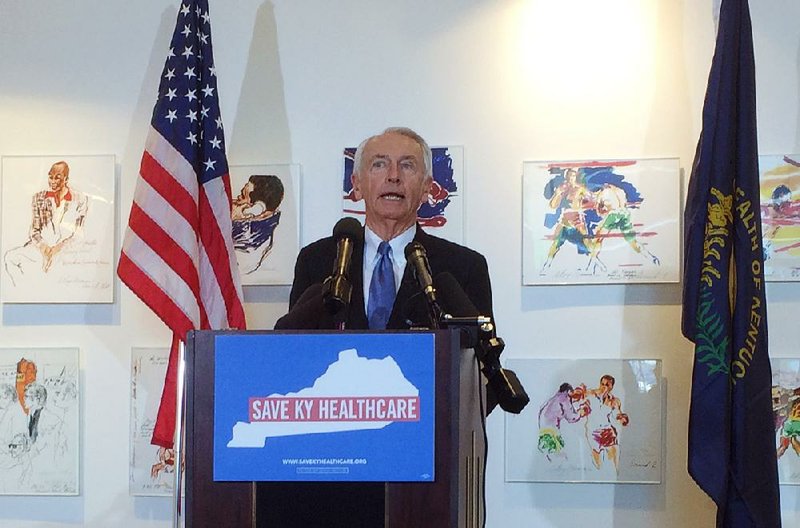LOUISVILLE, Ky. -- Former Democratic Gov. Steve Beshear began a major effort to thwart his Republican successor's health care policies, a move he described as an act of conscience that would protect his legacy and health insurance for more than half a million people.
Beshear announced Save Kentucky Healthcare, a tax-exempt organization that will pay for an online campaign against Republican Gov. Matt Bevin's plans to roll back expanded Medicaid in the state.
"Gov. Bevin is going to be held accountable for the moves that he makes and the hard questions will be asked about the impact of his decisions on Kentucky," Beshear said.
As governor, Beshear issued executive orders to expand the state's Medicaid program and establish Kynect, a state-operated exchange where people can purchase private health insurance plans with the help of a federal subsidy. More than 500,000 people have gotten health insurance through the programs, with more than 400,000 added to the state's Medicaid rolls.
Beshear's actions were possible because of the federal Patient Protection and Affordable Care Act, President Barack Obama's signature health care law. Kentucky's program has been roundly hailed a success. But given Obama's immense unpopularity in Kentucky, most state Democratic politicians do not actively defend Beshear's reforms.
"I was planning to ride off into the proverbial sunset, but my conscience won't let me do that," Beshear said. "I can't sit idly by because the people of Kentucky cannot afford to go backward."
Bevin fired back, saying in a statement he was "focused on fixing Kentucky's fiscal crisis after eight years of the Beshear administration increasing runaway Medicaid costs and refusing to fund the pensions of teachers and state workers to the tune of over $30 billion in unfunded liabilities."
Bevin, who took office in December, said he will dismantle Kynect by the end of the year, transitioning the 85,000 people who use it to a similar federal program. And he is asking the federal government for permission to charge a premium to some of the more than 400,000 people who have insurance through Kentucky's expanded Medicaid program in order to keep their coverage. If the federal government says no, Bevin has said he will repeal the expansion altogether.
Organizations such as the one Beshear started can raise unlimited amounts of money, but their primary focus has to be on social welfare issues. They can pay for partisan political ads, but only as a secondary activity.
Beshear said he will rely on private donors to fund his organization. He has more than $279,000 left over from the money he raised for his second inauguration in 2011, but Beshear said an opinion from the Registry of Election Finance says he cannot donate that money to Save Kentucky Healthcare.
Beshear could use the group to pay for ads to support the Democratic majority in the state House of Representatives, which could then work to block Bevin's agenda in the Legislature. The Kentucky House is the last legislative body in the South still controlled by Democrats. But Republicans need just five seats to take control for the first time since 1920, setting up a contentious and expensive fall election season.
"We're going to take advantage of every option that a 501c4 organization has to advocate and to educate," Beshear said, referencing the IRS designation for this type of organization. But he said he has not decided if that will include political ads.
A Gallup-Healthways survey, released last week, showed Kentucky leads the nation in the decline of its uninsured population. The survey, which interviews 500 people a day nearly every day of the year, attributed the decline to Kentucky's expanded Medicaid program and its state-based exchange. A Deloitte study, which Beshear commissioned and paid for with public money, concluded Kentucky would net a savings of $819 million by 2021 from its expanded Medicaid program. Bevin has rejected the study, saying it is based on unrealistic assumptions.
A Section on 02/12/2016
